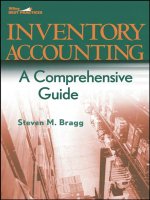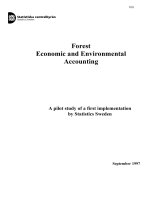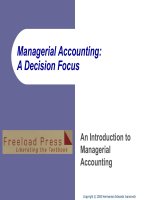Managerial accounting a decision focus
Bạn đang xem bản rút gọn của tài liệu. Xem và tải ngay bản đầy đủ của tài liệu tại đây (162.46 KB, 18 trang )
Copyright © 2005 Hermanson Edwards Ivancevich
Managerial Accounting:
A Decision Focus
An Introduction to
Managerial
Accounting
Chapter 1
Managerial Accounting: A Decision Focus 8e
Copyright © 2005 Hermanson Edwards Ivancevich
Financial & Managerial Accounting
Financial Accounting
–
To provide information to users and interested persons outside
the organization
Managerial Accounting
–
To provide useful information to managers (people inside the
organization)
Chapter 1
Managerial Accounting: A Decision Focus 8e
Copyright © 2005 Hermanson Edwards Ivancevich
Organizations
An organization is a group of people joined together in
seeking some common goal(s) or objective(s)
Organizations differ in their objectives; business firms
seek to generate profits, while not-for-profit
organizations do not.
Management of an organization will use strategic
planning to help it achieve its objectives
–
strategic decisions about the products
–
Not-for-profit organizations will make similar decisions
Chapter 1
Managerial Accounting: A Decision Focus 8e
Copyright © 2005 Hermanson Edwards Ivancevich
Organizing to Achieve Objectives
Management responsibility is decentralized
when it is shared by a number of persons.
–
Line departments
–
Staff departments
–
An organizational chart
Chapter 1
Managerial Accounting: A Decision Focus 8e
Copyright © 2005 Hermanson Edwards Ivancevich
Who’s Who in Accounting
The CFO (Chief Financial Officer) is the top
accounting officer and a member a top
management.
The controller is the manager of the accounting
department.
Chapter 1
Managerial Accounting: A Decision Focus 8e
Copyright © 2005 Hermanson Edwards Ivancevich
Basic Management Functions
Planning
Organizing
Directing
Controlling
Chapter 1
Managerial Accounting: A Decision Focus 8e
Copyright © 2005 Hermanson Edwards Ivancevich
Management by Exception (MBE)
The management function of control relies
heavily on management by exception.
Chapter 1
Managerial Accounting: A Decision Focus 8e
Copyright © 2005 Hermanson Edwards Ivancevich
Feedback
Establishing control over an organization
depends heavily on feedback information on
how well the organization is achieving its
objectives.
Feedback information is useful in
–
Appraising the activities or operations
–
Appraising the performance of individuals
Chapter 1
Managerial Accounting: A Decision Focus 8e
Copyright © 2005 Hermanson Edwards Ivancevich
A Model of the Decision-Making
Process
Chapter 1
Managerial Accounting: A Decision Focus 8e
Copyright © 2005 Hermanson Edwards Ivancevich
Organizations – Differences &
Similarities
Two Major Types of Organizations
–
Profit-seeking
Corporations
Partnerships
Single proprietorships
–
Not-for-profit
Governmental organizations
Non-governmental organizations
Chapter 1
Managerial Accounting: A Decision Focus 8e
Copyright © 2005 Hermanson Edwards Ivancevich
Nature of Information
Information – added knowledge
–
Quantitative information
–
Qualitative information
Relevant Information – pertinent to the decision
being made
Chapter 1
Managerial Accounting: A Decision Focus 8e
Copyright © 2005 Hermanson Edwards Ivancevich
Sources of Accounting Information
Financial Accounting Information -largely from
the data recorded for events and transactions
Management Accounting - comes from a variety
of sources within the organization.
Chapter 1
Managerial Accounting: A Decision Focus 8e
Copyright © 2005 Hermanson Edwards Ivancevich
Uses of Management Accounting
Information
Planning for future periods
–
Strategic planning
–
Capital budgeting
–
Annual budgeting
–
Short-range planning
Organizing – using resources in the best way to
achieve objectives
Directing – using daily information (e.g, costs, margins,
sales etc) to oversee operations
Controlling – comparing actual results against what
was planned; feedback in the form of performance
reports is quite useful.
Chapter 1
Managerial Accounting: A Decision Focus 8e
Copyright © 2005 Hermanson Edwards Ivancevich
Similarities Between Financial &
Managerial Accounting
The primary data for both are accumulated in
the same accounting system.
Both are concerned with managerial
responsibility.
Chapter 1
Managerial Accounting: A Decision Focus 8e
Copyright © 2005 Hermanson Edwards Ivancevich
Differences Between Management
Accounting and Financial Accounting (1)
Financial Accounting
–
Information guided by
GAAP
–
External reports regarding
the stewardship of
organization as a whole
–
Mandatory reporting
Managerial Accounting
–
Information governed by
usefulness to internal
users.
–
Internal reports regarding
the stewardship over
various parts of the
organization.
–
Voluntary reporting –
reported if benefits > cost
Chapter 1
Managerial Accounting: A Decision Focus 8e
Copyright © 2005 Hermanson Edwards Ivancevich
Differences Between Management
Accounting and Financial Accounting (2)
Financial Accounting
–
Primarily historical and
easily verifiable
information
–
Draws primarily from
economics
Managerial Accounting
–
Includes significant amounts
of prospective (forward
looking) information; also
includes many
approximations and more
nonmonetary information due
to need for timeliness
–
Draws heavily from
economics, finance,
statistics, and behavioral
sciences
Chapter 1
Managerial Accounting: A Decision Focus 8e
Copyright © 2005 Hermanson Edwards Ivancevich
Management Accounting as a
Recognized Discipline
Management Accounting is widely recognized
as a discipline in its own right.
Management accounting has broken beyond a
primary focus of recording costs to include a
myriad of information useful to managers
involved in decision making.
Chapter 1
Managerial Accounting: A Decision Focus 8e
Copyright © 2005 Hermanson Edwards Ivancevich
The CMA Certificate
Parts of the Exam:
–
Business Analysis
–
Management Accounting and Reporting
–
Strategic Management
–
Business Applications
Designation Awarded by the Institute of
Management Accountants (IMA)









